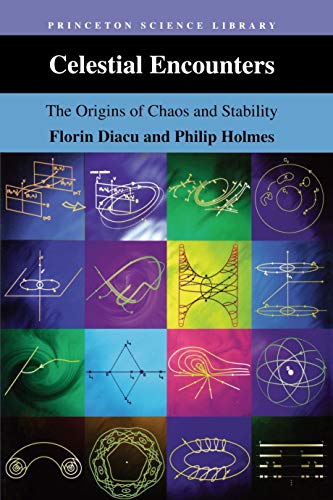DIACU, FLORIN; HOLMES, PHILIP J (10 Ergebnisse)
Suchfilter
Produktart
- Alle Product Types
- Bücher (10)
- Magazine & Zeitschriften (Keine weiteren Ergebnisse entsprechen dieser Verfeinerung)
- Comics (Keine weiteren Ergebnisse entsprechen dieser Verfeinerung)
- Noten (Keine weiteren Ergebnisse entsprechen dieser Verfeinerung)
- Kunst, Grafik & Poster (Keine weiteren Ergebnisse entsprechen dieser Verfeinerung)
- Fotografien (Keine weiteren Ergebnisse entsprechen dieser Verfeinerung)
- Karten (Keine weiteren Ergebnisse entsprechen dieser Verfeinerung)
- Manuskripte & Papierantiquitäten (Keine weiteren Ergebnisse entsprechen dieser Verfeinerung)
Zustand Mehr dazu
- Neu (6)
- Wie Neu, Sehr Gut oder Gut Bis Sehr Gut (Keine weiteren Ergebnisse entsprechen dieser Verfeinerung)
- Gut oder Befriedigend (3)
- Ausreichend oder Schlecht (Keine weiteren Ergebnisse entsprechen dieser Verfeinerung)
- Wie beschrieben (1)
Einband
Weitere Eigenschaften
- Erstausgabe (Keine weiteren Ergebnisse entsprechen dieser Verfeinerung)
- Signiert (Keine weiteren Ergebnisse entsprechen dieser Verfeinerung)
- Schutzumschlag (Keine weiteren Ergebnisse entsprechen dieser Verfeinerung)
- Angebotsfoto (5)
- Keine Print-on-Demand Angebote (9)
Sprache (2)
Gratisversand
Land des Verkäufers
Verkäuferbewertung
-
Celestial Encounters : The Origins of Chaos and Stability
Verlag: Princeton University Press, 1999
ISBN 10: 0691005451 ISBN 13: 9780691005454
Sprache: Englisch
Anbieter: Better World Books: West, Reno, NV, USA
Zustand: Good. Used book that is in clean, average condition without any missing pages.
-
Celestial Encounters : The Origins of Chaos and Stability
Verlag: Princeton University Press, 1999
ISBN 10: 0691005451 ISBN 13: 9780691005454
Sprache: Englisch
Anbieter: Better World Books, Mishawaka, IN, USA
Zustand: Very Good. Former library book; may include library markings. Used book that is in excellent condition. May show signs of wear or have minor defects.
-
Celestial Encounters : The Origins of Chaos and Stability
Verlag: Princeton University Press, 1996
ISBN 10: 0691027439 ISBN 13: 9780691027432
Sprache: Englisch
Anbieter: Better World Books, Mishawaka, IN, USA
Zustand: Good. Former library book; may include library markings. Used book that is in clean, average condition without any missing pages.
-
Celestial Encounters
Verlag: Princeton University Press, US, 1999
ISBN 10: 0691005451 ISBN 13: 9780691005454
Sprache: Englisch
Anbieter: Rarewaves.com USA, London, LONDO, Vereinigtes Königreich
EUR 39,66
Kostenlos für den Versand von Vereinigtes Königreich nach USAAnzahl: 1 verfügbar
In den WarenkorbPaperback. Zustand: New. Celestial Encounters is for anyone who has ever wondered about the foundations of chaos. In 1888, the 34-year-old Henri Poincare submitted a paper that was to change the course of science, but not before it underwent significant changes itself. "The Three-Body Problem and the Equations of Dynamics" won a prize sponsored by King Oscar II of Sweden and Norway and the journal Acta Mathematica, but after accepting the prize, Poincare found a serious mistake in his work. While correcting it, he discovered the phenomenon of chaos. Starting with the story of Poincare's work, Florin Diacu and Philip Holmes trace the history of attempts to solve the problems of celestial mechanics first posed in Isaac Newton's Principia in 1686. In describing how mathematical rigor was brought to bear on one of our oldest fascinations--the motions of the heavens--they introduce the people whose ideas led to the flourishing field now called nonlinear dynamics. In presenting the modern theory of dynamical systems, the models underlying much of modern science are described pictorially, using the geometrical language invented by Poincare.More generally, the authors reflect on mathematical creativity and the roles that chance encounters, politics, and circumstance play in it.
-
Celestial Encounters
Verlag: Princeton University Press, US, 1999
ISBN 10: 0691005451 ISBN 13: 9780691005454
Sprache: Englisch
Anbieter: Rarewaves USA, OSWEGO, IL, USA
EUR 41,85
Kostenlos für den Versand innerhalb von/der USAAnzahl: Mehr als 20 verfügbar
In den WarenkorbPaperback. Zustand: New. Celestial Encounters is for anyone who has ever wondered about the foundations of chaos. In 1888, the 34-year-old Henri Poincare submitted a paper that was to change the course of science, but not before it underwent significant changes itself. "The Three-Body Problem and the Equations of Dynamics" won a prize sponsored by King Oscar II of Sweden and Norway and the journal Acta Mathematica, but after accepting the prize, Poincare found a serious mistake in his work. While correcting it, he discovered the phenomenon of chaos. Starting with the story of Poincare's work, Florin Diacu and Philip Holmes trace the history of attempts to solve the problems of celestial mechanics first posed in Isaac Newton's Principia in 1686. In describing how mathematical rigor was brought to bear on one of our oldest fascinations--the motions of the heavens--they introduce the people whose ideas led to the flourishing field now called nonlinear dynamics. In presenting the modern theory of dynamical systems, the models underlying much of modern science are described pictorially, using the geometrical language invented by Poincare.More generally, the authors reflect on mathematical creativity and the roles that chance encounters, politics, and circumstance play in it.
-
Celestial Encounters
Verlag: Princeton University Press, 1999
ISBN 10: 0691005451 ISBN 13: 9780691005454
Sprache: Englisch
Anbieter: BennettBooksLtd, San Diego, NV, USA
paperback. Zustand: New. In shrink wrap. Looks like an interesting title!
-
Celestial Encounters
Verlag: Princeton University Press, US, 1999
ISBN 10: 0691005451 ISBN 13: 9780691005454
Sprache: Englisch
Anbieter: Rarewaves USA United, OSWEGO, IL, USA
EUR 43,29
EUR 43,12 für den Versand innerhalb von/der USAAnzahl: Mehr als 20 verfügbar
In den WarenkorbPaperback. Zustand: New. Celestial Encounters is for anyone who has ever wondered about the foundations of chaos. In 1888, the 34-year-old Henri Poincare submitted a paper that was to change the course of science, but not before it underwent significant changes itself. "The Three-Body Problem and the Equations of Dynamics" won a prize sponsored by King Oscar II of Sweden and Norway and the journal Acta Mathematica, but after accepting the prize, Poincare found a serious mistake in his work. While correcting it, he discovered the phenomenon of chaos. Starting with the story of Poincare's work, Florin Diacu and Philip Holmes trace the history of attempts to solve the problems of celestial mechanics first posed in Isaac Newton's Principia in 1686. In describing how mathematical rigor was brought to bear on one of our oldest fascinations--the motions of the heavens--they introduce the people whose ideas led to the flourishing field now called nonlinear dynamics. In presenting the modern theory of dynamical systems, the models underlying much of modern science are described pictorially, using the geometrical language invented by Poincare.More generally, the authors reflect on mathematical creativity and the roles that chance encounters, politics, and circumstance play in it.
-
Celestial Encounters
Verlag: Princeton University Press, US, 1999
ISBN 10: 0691005451 ISBN 13: 9780691005454
Sprache: Englisch
Anbieter: Rarewaves.com UK, London, Vereinigtes Königreich
EUR 34,98
EUR 73,72 für den Versand von Vereinigtes Königreich nach USAAnzahl: 1 verfügbar
In den WarenkorbPaperback. Zustand: New. Celestial Encounters is for anyone who has ever wondered about the foundations of chaos. In 1888, the 34-year-old Henri Poincare submitted a paper that was to change the course of science, but not before it underwent significant changes itself. "The Three-Body Problem and the Equations of Dynamics" won a prize sponsored by King Oscar II of Sweden and Norway and the journal Acta Mathematica, but after accepting the prize, Poincare found a serious mistake in his work. While correcting it, he discovered the phenomenon of chaos. Starting with the story of Poincare's work, Florin Diacu and Philip Holmes trace the history of attempts to solve the problems of celestial mechanics first posed in Isaac Newton's Principia in 1686. In describing how mathematical rigor was brought to bear on one of our oldest fascinations--the motions of the heavens--they introduce the people whose ideas led to the flourishing field now called nonlinear dynamics. In presenting the modern theory of dynamical systems, the models underlying much of modern science are described pictorially, using the geometrical language invented by Poincare.More generally, the authors reflect on mathematical creativity and the roles that chance encounters, politics, and circumstance play in it.
-
Celestial Encounters- The Origins of Chaos and Stability.
Verlag: New Haven: Princeton University Press 1996., 1996
Anbieter: Antiquariat Bergische Bücherstube Mewes, Overath, Deutschland
XV, 233 S., Reg. Ln.mS. *neuwertig*.
-
Celestial Encounters
Verlag: Princeton University Press, 1999
ISBN 10: 0691005451 ISBN 13: 9780691005454
Sprache: Englisch
Anbieter: moluna, Greven, Deutschland
EUR 44,58
EUR 48,99 für den Versand von Deutschland nach USAAnzahl: Mehr als 20 verfügbar
In den WarenkorbZustand: New. Dieser Artikel ist ein Print on Demand Artikel und wird nach Ihrer Bestellung fuer Sie gedruckt. Presenting the story of Poincare s work, this book traces the history of attempts to solve the problems of celestial mechanics posed in Isaac Newton s Principia in 1686. It introduces the people whose ideas led to the field called nonlinear dynamics.









